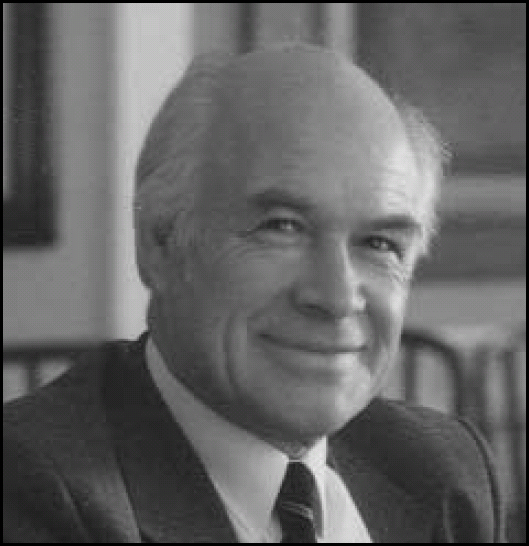Formerly Medical Administrator and Consultant Psychiatrist, Crichton Royal, Dumfries

Dr George Stirling passed away peacefully after a short illness on 18 January 2011.
George was born on 20 April 1926 in Aberdeen to George and Alice Stirling. After initial schooling at the Royal Academy Inverness, he moved to Robert Gordon's School, Aberdeen, leaving in 1944. He then entered the Medical School of Aberdeen University qualifying in 1949. After completing his house jobs at the Royal Cornhill Hospital, he joined the Royal Air Force (RAF) for 2 years’ National Service in 1950. He served at RAF Experimental Establishments in Farnborough and Boscombe Down, Wiltshire, which was then a secret location for both civilian and RAF test pilots. It was during his service with the RAF that he came across pilots suffering from previously unrecognised stress-related conditions, acting as their advocate in the higher echelons of Whitehall. This experience led to his lifelong interest in psychiatry. Thereafter he worked as a locum general practitioner for 6 months before becoming a resident house physician in general medicine at Woodend General Hospital.
He entered training in psychiatry as a Crichton Royal Fellow at the Crichton Royal Hospital, Dumfries, in 1953 and obtained the DPM in 1954. He was appointed as a registrar and then senior registrar at the Crichton, a post that he held from June 1955 to January 1960. He then worked for 3 months as a senior hospital medical officer before being appointed a consultant psychiatrist at the Crichton. He became the medical administrator at the Crichton in 1979. Finally, he retired from clinical practice in 1987, the longest serving medical member of staff with just under 35 years of service. He received the MRCPsych in 1971, becoming FRCPsych in 1977. He was awarded the MRCP (Glasgow) in 1984 and FRCP (Glasgow) in 1986.
George was known for his passion and commitment. He remembered the pre-psychotropic era in psychiatry as the ‘appalling years’ since so little could be offered as treatment options. Never shy of judicious and appropriate use of new treatment methods he participated in use of chlorpromazine in people with severe psychosis with Dr W. Mayer Gross when it and other psychotropic drugs were introduced. He also assisted the Dumfries surgeons in carrying out prefrontal leucotomies when it became a treatment of choice.
His main clinical interest was with the chronically mentally ill, their lifestyle, well-being and getting the most out of their remaining abilities. He set up what became known as Solway Industrial Unit for long-stay in-patients, out-patients and day patients. It pioneered production of goods for the community at large. George's commitment and passion succeeded in raising a large sum of money to set up a seaside residential holiday facility for the long-stay in-patients. He believed in regular ongoing review of the mental and physical health of long-term patients. He had the vision to see that the future of psychiatry was in the community and thus worked in a team of social workers, community psychiatric nurses, in-patient nurses, psychologists, occupational therapists and recreational therapists long before community teams and psychiatric practice became the norm.
Early in his career George was awarded a Council of Europe Travelling Fellowship to Scandinavia in 1957 and a World Health Organization Travelling Scholarship in Rehabilitation to Poland and the UK in 1967. He introduced and provided a psychiatric service to the Young Offenders Institution, Dumfries, from 1958 to 1972, and acted as an Independent Psychiatrist for Appeals under the Mental Health Act to detained patients at the State Hospital, Carstairs, a role he continued with for several years after retirement. He took on numerous administrative posts both locally in Dumfries and Galloway, and nationally. Significantly, he was the medical administrator of the Crichton Royal Hospital until his retirement and served nationally on the Executive Committee of the Scottish Division of the Royal College of Psychiatrists, becoming Chairman of the Forensic Section in 1972-73.
George could be relied on to be an erudite, witty and entertaining speaker both in a formal setting and in the company of his friends. He enjoyed his hobbies. He loved fishing for sea trout in the local rivers of south-west Scotland and annual fly-fishing holidays in the Highlands for sea trout and salmon. He played a major role in setting up Loch Kindar Fishing Club near New Abbey, going on to become Secretary and then Chairman of the club. He loved the tranquillity and being at one with nature. He also enjoyed the camaraderie and open countryside involved in rough shooting. He had been a member of the prestigious Dumfries Burns Howff Club since 1957 and became its President in 1962. He had been made its Honorary President shortly before his death. He also found time to be a member of the Three Counties Medical Curling Club for many years and was a keen gardener who could not bear to throw anything away, thus collecting endless pots of surplus plants of all descriptions. Not many knew about his passion for the teachings of Buddha, or the sayings of Omar Khayyam, and all things spiritual - he was also a firm believer in his faith.
When he retired in 1987 he and his wife Yvonne bought a wonderful house on the Costa Del Sol where they royally entertained both local Spanish friends and many visitors from the UK. They divided their time between Spain where he loved the sunshine and Scotland where he could enjoy watching his grandchildren and great-granddaughter Erin, now almost 4, grow. George proved his commitment to his newly adopted country by studying Spanish at the local school in Dumfries up to the Scottish Higher level. He loved organising parties and was a most wonderful and generous host. For George, the glass of life was most definitely at least half full.
Psychiatry has lost a memorable and passionate man.



eLetters
No eLetters have been published for this article.